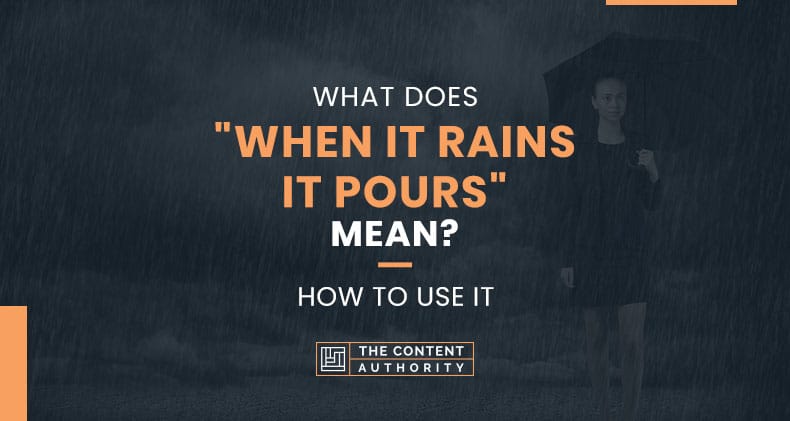Have you ever felt that when things happen in your life, they usually occur all at once or overwhelmingly? When the series of events unfolding themselves bring about joy, people quite obviously do not mind. But when those incidents are negative or debilitating, you realize how true the saying “when it rains, it pours” is.
The expression “when it rains, it pours” denotes “when things happen, they occur all at once”. A bad or good experience in isolation is rare. The phrase is used in sentences to express helplessness or describe adverse circumstances. You can also use it in texts to discuss positive things.
If you’d like to learn more about the expression’s meaning and origin, how to use it in texts, and a host of other pertinent information, keep reading.
“When It Rains It Pours” – Meaning
The saying “when it rains, it pours” denotes “when things happen, they happen at a scale larger than normal, or get enlarged by existing scenarios”. The expression may also signify things (identical or distinct) occurring multiple times or quickly in a short period. When things or occurrences happen in consolidation, you could metaphorically describe it as “when it rains, it pours”.
The term could be interpreted either positively or negatively. The connotation is usually negative, or the phrase is primarily used in unfavorable contexts. But then it’s also not rare to employ the idiom in your texts or conversations and refer to positive things in the same vein.

Other ways to mean or say “when it rains, it pours” include:
- Misery loves company
- Trouble never knocks at your door in solitude
- Bad fortune comes in three
- Evil chance rarely comes by itself
Kindly note, the above phrases could be recognized sayings or a group of words not classified as “idioms”. Also, all of them have negative connotations. It’s, therefore, safe to assume the phrase “when it rains, it pours” is generally used to describe or refer to gloomy scenarios.
The Term’s Origin and Subsequent Popularity
As far as the term’s roots are concerned, it’s not clear where or when it all began. According to some, the expression was first documented in 1726 in the written piece, “It Cannot Rain But It Pours”, by Alexander Pope and Jonathan Swift. It’s not clear-cut if the phrase was coined by the two or the saying was already popular back then.
That said, Morton Salt, the American food company, had a significant part to play in the phrase’s popularity or establishing its positioning in everyday vocabulary when it used the saying in one of its table salt advertisements in 1911. The idiom helped the company explain the salt’s advanced attributes to the general public, which boosted sales.
Before the innovation that Morton Salt had introduced through its salt, monsoons turned houses into humidity chambers, causing cooking salt in the kitchens to clump. Morton Salt’s innovative approach ensured the salt didn’t cluster even during heavy rains. The expression pretty much became the company’s slogan or got identified with its salt product.
The phrase caught on and is widely used in pop culture and regular conversations ever since. Music artists such as Eminem, 50 Cent, etc., have incorporated the proverb in their songs.

Using the Phrase “When It Rains, It Pours” in Texts
The phrase, like most lengthy sayings, is a bit tricky or challenging to incorporate in texts. It’s particularly difficult to blend it with an existing sentence, as the expression is a proper sentence by itself.
The following are a couple of instances in which the phrase is successfully integrated into an existing construct:
- Well, as the saying goes, when it rains, it pours.
- I set aside at least 50% of my monthly income as savings. Because I know when it rains, it pours; and I want to be prepared for the time when things aren’t going as per plan.
The length and the relative complexity attached to the phrase may seem like the phrase rarely or never gets used in everyday conversations. But it’s the exact opposite, or it’s more than just seldomly used.
Here is an example where two people are having a regular chat, and the phrase is used by one of them:
“A: How are you?
B: I am doing well. How have you been?
A: Well, not that great.
B: What happened?
A: Well, it’s a long story.
B: Oh, let me in if you don’t mind.
A: A month ago, I met with a major acciden
t. Luckily, I did not get hurt too bad, but my car got smashed big time. The repair and restoration costs were enormous. I opted to buy a new vehicle instead of putting up with the repair expenses. It’s only been a few weeks since the new car purchase, and now my laptop is acting up too. It’s a major issue, from what I could guess, and I may have to spend a tiny fortune again.
B: Sorry to hear about that. Well, all I can say is when it rains, it pours. Be a bit more careful next time.”
Also, it’s not uncommon to modify the phrase a bit for convenience’s sake or to better fit the idiom into texts. For example:
- Only a few months ago, I couldn’t afford to buy a laptop. And now, just a couple of days ago, I bought fully decked-up desktop computers for my entire team. When it’s supposed to rain, it usually pours.
- For her flourishing business, she needed skilled employees. Until last month, she couldn’t find suitable candidates. Now, in a week, she has managed to get on board four assistants, a supervisor, and several analysts who’ll be working directly on the projects. It indeed pours when it rains.
It’s believed the phrase is an alteration of the saying “It never rains, but it pours”. Using the other phrase instead of “when it rains, it pours” is therefore okay.
Also, as clearly illustrated in the sentences above, the phrase “when it rains, it pours” is invariably used in texts only after a proper premise exists or is built for it. In other words, the proverb pretty much summarizes the events or the emotions attached to it. When used by itself or as a standalone sentence, it may fail to impact the reader or convey the intended meaning.

Examples Sentences with “When It Rains, It Pours”
The following is a list of sentences incorporating the phrase, both positively and negatively:
- At one phase in their business, the profits were constantly rising. It was like when it rains, it pours. Once those glory days were over, however, the owners had to close the company down.
- Jim just wanted to get some job that justified his college education or something where he could put all that he learned in university to actual use. But as they say, when it rains, it pours. He did not just get a job that suited his skills but also one that paid handsomely – more than he initially anticipated.
- I am completely aware that when it rains, it pours. That’s precisely why I am saving and not spending on things that I don’t need currently.
- Our company was looking for a few more projects to keep our new hires occupied. In our hunt for clients, we managed to bag more than just a handful of them. The workload is now so much that we have no option but to hire even more people. It’s rightly said, “when it rains, it pours“.
- Before he became a millionaire, he was homeless. Today, he has four mansions in some of the poshest neighborhoods in the country. When it rains, it pours!
- The store had a minor fire accident in August. The following month another fire disaster took place, which burnt almost the entire store down. As it’s rightly said, “when it rains, it pours“.
- We won only four out of the 14 matches last season. This season we are 11 games down and haven’t won even a single contest. When it rains, it pours!
- After four months of hunting for a job, I am currently interviewing at five companies, with jobs almost confirmed at two of them. When it rains, it pours, I guess.
- It was a terrible year. I lost my job. My wife’s business was experiencing losses for the first time in its history. And my parents were falling sick continually. It was like the saying, “when it pours, it rains”.
- First, I lost the keys to the house. And then my car broke down in the middle of nowhere while I was heading back to get the keys. When it rains, it pours!
- I cannot believe the things I endured yesterday. My phone crashed. My cat broke the crockery. I also had stomach pain and was just drinking soup as a result. A lot of things happened. When it rains, it pours!
English Idioms
Conclusion
Quite often, things don’t happen as per plan, or things fall apart without any apparent reason or when you least expect them to. Whenever things get upended, they have a significant impact. That is life for you in a gist. And that philosophy is precisely what the saying “when it rains, it pours” tries to encapsulate.
As clearly stated and illustrated above, the idiom is primarily used in negative constructs or contexts when writing or in speech. It may not seamlessly fit into a positive dialogue or when ascribing to something happy or fun. But the example sentences above also prove it’s okay to use the idiom in positive sentences.
When trying to implement the phrase in your texts, keep the aforementioned in mind. Besides that, you’re golden.
Shawn Manaher is the founder and CEO of The Content Authority. He’s one part content manager, one part writing ninja organizer, and two parts leader of top content creators. You don’t even want to know what he calls pancakes.

